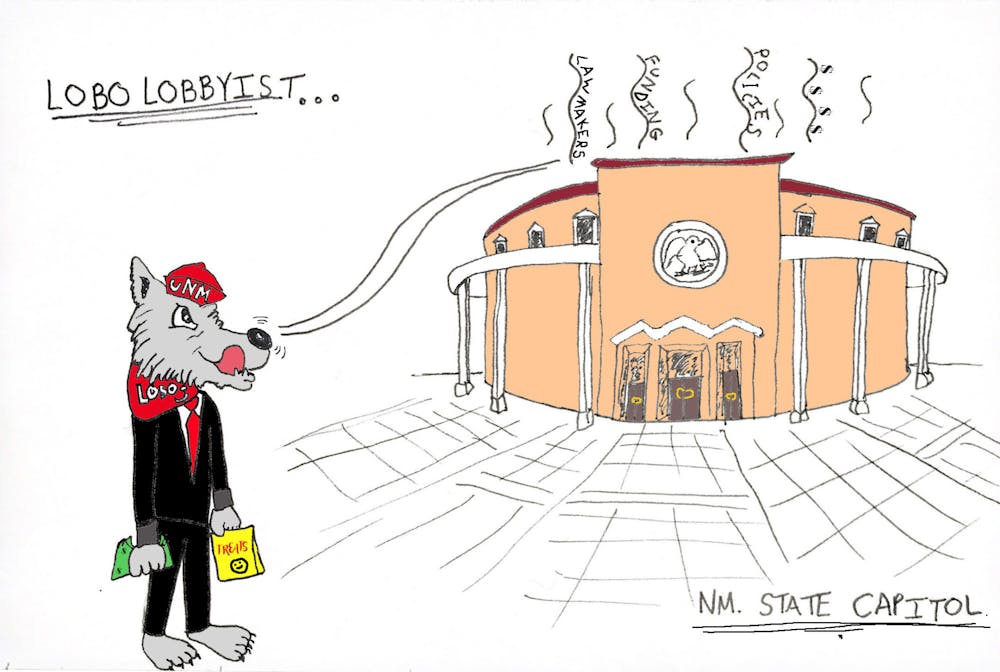The University of New Mexico, like many other educational institutions across the country, lobbies the local and federal government to advance its interests.
Lobbying is the attempt to influence a legislative decision or an official action by a state official or state agency, board or commission, according to the New Mexico Office of the Secretary of State. UNM employs five lobbyists, including two contract lobbyists, who are hired to work on a certain issue for a certain period of time, according to Mike Puelle, chief government relations officer and lobbyist at UNM.
Each year during the state legislative session, UNM’s priorities include base funding for the University, compensation for faculty and staff, campus safety, and student success, according to Provost and Executive Vice President for Academic Affairs James Holloway. New interests regularly come up, Holloway said, like campus building renovations.
Holloway is a part of a leadership team under UNM President Garnett Stokes that discusses and helps Stokes prioritize the ideas UNM lobbyists take to the legislature each year, he said. The regular legislative session in New Mexico occurs every January. Sessions alternate each year between 30 and 60 days in length.
“We want to help our legislators, our elected officials, the others working in state government to understand the ways in which we can help and contribute, and to understand where our constraints are and how they might help us overcome these,” Holloway said.
The UNM Office of Government and Community Relations lobbies on behalf of the University. Though UNM lobbyists primarily focus on University funding, they can also advocate for policies, Puelle said.
“There are a lot of public policy and public funding interests that we have as a university — especially as a public university and as a research university, because we’re often in pursuit of resources,” Puelle said.
UNM lobbyists can both recommend policy to be adopted and advocate for changes in existing policy, Puelle said.
“We call it playing both offense and defense,” Puelle said. “I want to be clear that sometimes when we're getting involved with policy issues, it's because it's our job to make sure that if (state legislators are) making this policy or altering this policy, (they) know how this is going to impact the stakeholders at UNM.”
For example, UNM lobbied for what became a New Mexico constitutional amendment on the state ballot, according to Holloway. The constitutional amendment, which passed on Election Day, will allow the dean of the UNM School of Law to select the chair of the judicial nomination commission, according to Ballotpedia.
On the federal level, UNM lobbyists typically work with agencies that develop programs that may contribute to New Mexico, according to Holloway. They also work with New Mexico’s congressional delegation — Sens. Martin Heinrich and Ben Ray Luján; and Reps. Melanie Stansbury, Gabe Vasquez and Teresa Leger Fernández — Holloway said.
In the state legislature, UNM lobbies for its specific interests but also collaborates with other universities to advocate for common priorities, Puelle said.
Get content from The Daily Lobo delivered to your inbox
Stokes is a member of the leadership team of the Council of University Presidents. Presidents of other New Mexico colleges and universities also make up the leadership team.
In January, the Council of University Presidents and two other higher education associations released unified priorities for the 2024 legislative session. The request included $83.1 million in recurring funding for student support initiatives, campus safety services and employee benefit enhancements.
UNM successfully influenced many significant policy bills and appropriations during the 2024 legislative session, according to a UNM Office of Government and Community Relations report.
The regular New Mexico legislative session begins on Jan. 21, 2025.
Lily Alexander is the editor-in-chief of the Daily Lobo. She can be reached at editorinchief@dailylobo.com or on X @llilyalexander
Nate Bernard is the news editor for the Daily Lobo. He can be reached at news@dailylobo.com or on X @natebernard14
Lily Alexander is the 2024-2025 Editor of the Daily Lobo. She can be reached at editorinchief@dailylobo.com or on Twitter @llilyalexander






